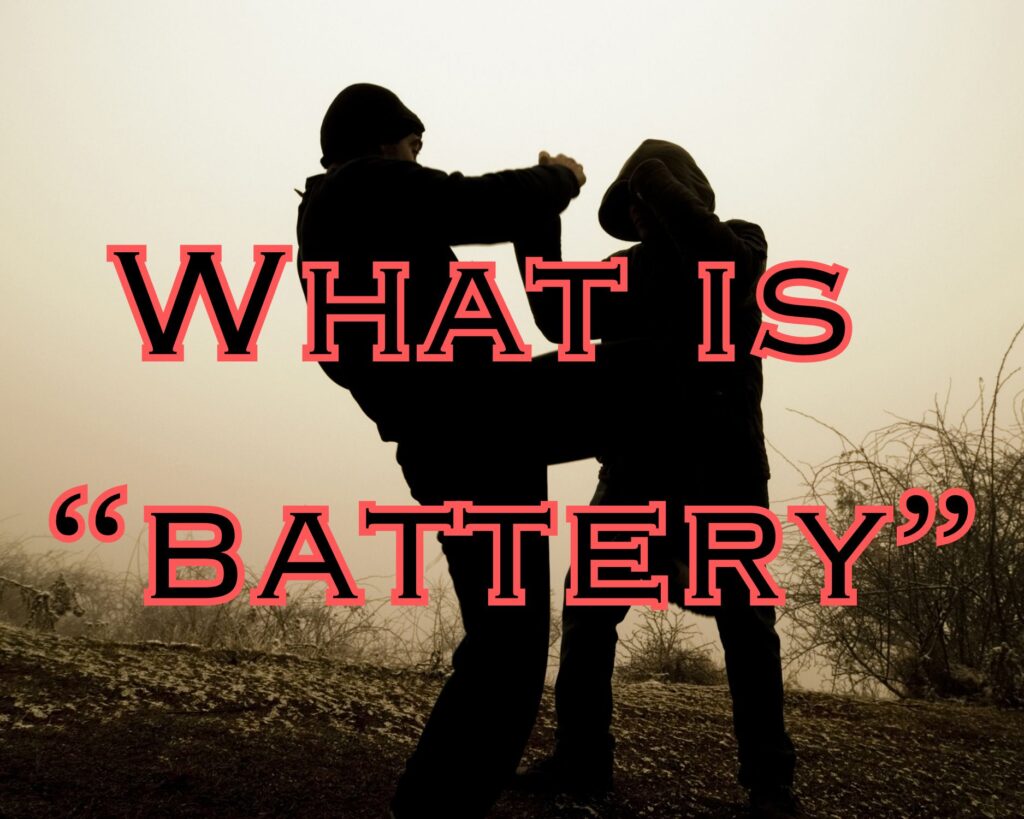Battery, in legal terms, is a concept that is often misunderstood or confused with other legal terms like assault. This article aims to clarify what battery means in the context of law, its implications, and how it is distinguished from related legal concepts.
Definition of Battery
Battery is defined as the intentional and unlawful physical contact or use of force against another person without their consent. It is a tort, which means it’s a civil wrong, and it can also be a criminal offense depending on the jurisdiction and the severity of the act.

Key Elements of Battery
- Intentional Act: The act must be intentional; accidental contact usually does not constitute battery.
- Unlawful Contact: The contact must be unlawful, meaning it is not legally justified or excused.
- Harmful or Offensive: The contact must be harmful or offensive. Harmful contact causes physical injury, while offensive contact is that which would offend a reasonable person’s sense of dignity.
Battery vs. Assault
It’s important to distinguish battery from assault, as they are often used interchangeably but have different legal meanings.
Assault: The Threat of Harm
- Assault: Assault is the act of creating an apprehension of harmful or offensive contact. It’s the threat or attempt to commit battery.
- No Physical Contact Necessary: In an assault, physical contact is not necessary; the key element is the fear or apprehension of such contact.
Battery: The Actual Harm
- Battery: Battery, on the other hand, involves actual physical contact or harm.
- Completion of Assault: In many cases, battery can be seen as the completion of an assault.
Criminal vs. Civil Battery
Battery can be prosecuted as a criminal offense, and it can also be the basis for a civil lawsuit.
Criminal Battery
- Criminal Charges: In criminal law, battery is a charge brought by the state against the perpetrator. It can range from a misdemeanor to a felony, depending on the severity.
- Penalties: Penalties for criminal battery can include fines, imprisonment, probation, and community service.
Civil Battery
- Civil Lawsuit: In civil law, the victim of battery can sue the perpetrator for damages.
- Compensation: The victim may seek compensation for medical expenses, lost wages, pain and suffering, and other damages resulting from the battery.
Defenses to Battery
There are several defenses that can be raised in a battery case, both in criminal and civil contexts.
Common Defenses
- Consent: If the alleged victim consented to the contact, it might not be considered battery.
- Self-Defense: Acting in self-defense or defense of others can be a valid defense, provided the response was reasonable and proportionate to the threat.
- Accidental Contact: If the contact was accidental and not intentional, it may not constitute battery.
Utilizing Self-Defense Tools and Resources
In the context of battery and self-defense, having the right tools and knowledge is crucial. Products like the SABRE Smart Bluetooth® Pepper Spray and educational resources such as “The Law of Self Defense” book can be incredibly useful. Let’s explore how these items can aid in self-defense and legal understanding.
SABRE Smart Bluetooth® Pepper Spray
The SABRE Smart Bluetooth® Pepper Spray is a cutting-edge self-defense tool that offers several features enhancing personal safety:
- Live GPS Tracking: This feature allows for real-time location sharing, which can be crucial in emergency situations. It enables quick response from authorities or loved ones.
- Emergency Alerts: The pepper spray is equipped with the capability to send text and phone call alerts during emergencies, ensuring that help can be summoned immediately.
- Effective Defense Mechanism: Designed for rapid deployment, the Fast Flip Top™ ensures quick and easy access, which is vital in sudden confrontations.
- Training Spray Included: Understanding how to effectively use pepper spray is essential. The included training spray allows users to practice and prepare for real-life scenarios without risk.
- Refillable Canisters: The option for refill canisters makes this a long-term investment in personal safety.
“The Law of Self Defense” Book
Understanding the legal aspects of self-defense is equally important. “The Law of Self Defense” book is an indispensable guide for anyone who wants to comprehend the legalities surrounding self-defense, especially for armed citizens:
- Comprehensive Legal Guide: This book provides an in-depth look at the laws governing self-defense. It helps readers understand when and how they can legally defend themselves.
- Real-World Scenarios: By exploring various scenarios, the book offers practical advice that can be applied in real-life situations.
- Expert Knowledge: Written by a legal expert, this guide is a reliable source of information, helping readers navigate the complex legal landscape of self-defense.
Importance in the Context of Battery
In situations where one might face battery, being equipped with both practical defense tools and legal knowledge is invaluable:
- Preparedness: Having a pepper spray like the SABRE Smart Bluetooth® and understanding its legal use ensures that you are prepared for potential threats.
- Legal Awareness: Knowledge from resources like “The Law of Self Defense” book empowers individuals to make decisions that are legally sound and defensible.
What Constitutes Battery in a Legal Sense?
Battery is the intentional and unlawful physical contact or use of force against another person without their consent. It involves an act that is harmful or offensive and is executed without the legal justification or excuse.
How Does Self-Defense Relate to Battery?
Self-defense is a legal defense used when a person responds with reasonable force to protect themselves from physical harm. In the context of battery, if someone uses force to defend themselves from an imminent threat of battery, their actions can be justified as self-defense.
What is Considered Reasonable Force in Self-Defense?
Reasonable force is the minimum level of force necessary to protect oneself from harm. It varies depending on the circumstances but must be proportionate to the threat faced. Excessive force, beyond what is necessary for protection, may not be considered reasonable and could lead to legal consequences.
Can I Face Legal Charges for Defending Myself?
Yes, it’s possible to face legal charges even when defending yourself, especially if the force used is deemed excessive or unreasonable. It’s crucial to understand the legal limits of self-defense to avoid potential legal issues.
How Can Products Like Pepper Spray Be Used in Self-Defense?
Products like pepper spray can be used as a non-lethal means of self-defense to prevent an imminent battery. However, they should be used within legal guidelines. The SABRE Smart Bluetooth® Pepper Spray is designed for quick and effective defense while ensuring legal compliance with features like GPS tracking and emergency alerts.
Is It Legal to Carry Pepper Spray for Self-Defense?
In most jurisdictions, it is legal to carry pepper spray for self-defense purposes. However, there may be restrictions on the size, strength, or type of pepper spray allowed. It’s important to be aware of local laws regarding the carrying and use of pepper spray.
What Should I Do If I’m Charged with Battery After Defending Myself?
If you’re charged with battery after a self-defense incident, it’s important to seek legal counsel immediately. An attorney can help you navigate the legal system and present a defense based on the circumstances of your case.
How Can I Educate Myself on Self-Defense Laws?
Educating yourself on self-defense laws is crucial for understanding your rights and responsibilities. Reading resources like “The Law of Self Defense” book can provide valuable insights into legal principles and practical scenarios related to self-defense.
Can I Use Force to Defend My Property?
The use of force to defend property is legally more complex and varies by jurisdiction. Generally, non-lethal force may be permissible, but lethal force is often legally justified only in defense of oneself or others from physical harm.
What Are the Legal Consequences of Using Excessive Force in Self-Defense?
Using excessive force in self-defense can lead to criminal charges such as assault or battery. The legal consequences can include fines, imprisonment, and civil liability for injuries caused.
As an Amazon Associate we earn from qualifying purchases through some links in our articles.




